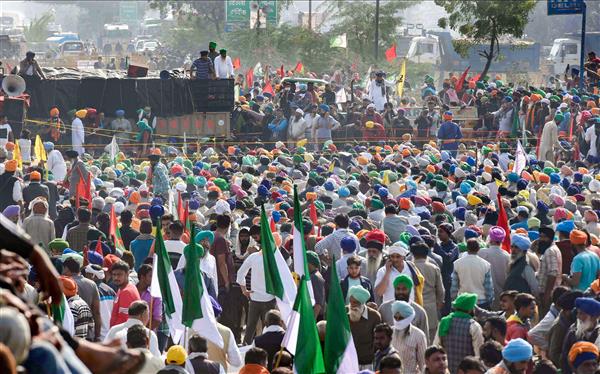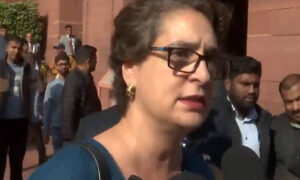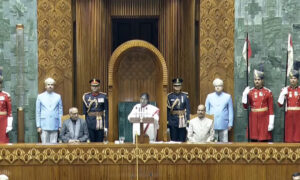
“Democracy is government by discussion”. This prescient remark of Amartya Sen should be borne in mind when you look at the on going farmers agitation demanding repeal of the three farm reform laws the Centre have enacted in this year. These are: 1. Farmers’ Produce Trade and Commerce ( Promotion and Facilitation) Act; The Farmers ( Empowerment and Protection) Agreement and on Price Assurance and Farm Services, Act 2020 and the Essential Commodities ( Amendment)Act 2020. Earlier in June 2020 three Ordinances were promulgated covering these legislations which were passed by the Parliament on 27.09.2020 and became a part of the statute book on receipt of the assent of the President.
Peaceful protests which do not trangress the limits set by are a part of the ” discussion” mode and are not only legitimate but are seen in matured democracies as proof of its existence and strength, because protests lead to discussion and facilitate resolution of the contentious issues which might have caused protests in the first place.
From this broad perspective, if one looks at the protests even when the leadership of the movement is engaged in discussing the issues with the central government it would be worthwhile first to examine first, the objections raised about the manner – allegedly in violation of the spirit of law or policy making in a democracy and then examine the merits of the laws before forming any definite view on the issues.
3. (a)Two issues have been raised of which the first is the way the Farm reforms bills were pushed through; first ,it was promulgated as an ordinance as if its implementation was so very urgent in the public interest that its enactment through the normal process of Parliamentary scrutiny would have caused unacceptable delay and damage to the Farm sector, and second the Ordinance was carried by voice vote in the Parliament which made the bills laws and part of the statute book without going through the normal process of scrutiny of the Parliamentary Committee and even serious debate in both the houses of Parliament as the sessions had to be cut short due to the Pandemic. Subsequent developments even before the farmers agitation that is going on now ,such as out right rejection of the bills by several State Govt’s especially by Punjab, a major state involved in making the ” reforms ” work and serious reservations expressed in different parts by farmers organizations and agriculture experts suggest that the laws were made in a hurry which is hard to justify as delay in its implementation is now a a fact of life.
(3b)The second issue is the constitutionality of the laws, that is, legal validity as the Centre’s act of invoking Entry 33 in the Concurrent List ( List 3) which provides for a Central role in ” trade and Commerce in and production, supply and trade of any industry where the control of such industry by the Union is declared by Parliament by law to be expedient in the public interest and imported goods of the same kind such as such Products; (b) food stuffs, including edible oil seeds and oils; (c) cattle fodder including oilcakes and other concentrates;(d) raw cotton, whether grinned or ungrinned, and cotton seed; and (e) raw jute. Nevertheless the fact is that agriculture is substantively a State subject ( Entry 14 in the State List ( List 2 of the Constitution). Moreover, entry 26 in the state list refers to ” trade and Commerce within the state, Entry 27 to ” production, supply and distribution of goods and Entry 28 to ” markets and fairs”. There is thus some strength in the view of some constitutional experts that the power of the Union under the aforementioned Entry 33 of the Concurrent List- List 3 which was inserted through the Constitution ( Third Amendment) Act 1954 is not absolute as the main subject Agriculture and trade and fairs is exclusively in State List. This has led legal experts to conclude that Entry 28 in List 2- markets and fairs is not subject to Entry 33 in the List 3 , and therefore the constitutional validity of the farm laws is open to questions.
(4)Now that the farmers agitation has been steadily gaining around across the country and the agitators have occupied huge public space right on the NH Way system and the Delhi Jaipur high way it’s time to evolve a way to get out of the impasse acceptable to all even when the leadership of the farmers agitation is firm in its demand for repeal of the three laws first before any thing else.
Now look at the main contentious issues: These are first, fear about continuation of state procurement – mainly by the Food Corporation of India and the state agencies at Minimum Support Price, second, farmers’ serious concerns about parity between the state run and private Mandis proposed in the new laws as they fear that the concessions proposed for the private markets would eventually destroy the State Mandis set up under the APMC Act and therefore the MSP based procurement ;, third , registration of traders and dispute resolution mechanism as laid down in the laws would give undue advantage to the traders; and finally the apprehension that ” contract farming” will introduce an unequal relationship between the corporates and farmers which is certain to ensure steady transfer of farmers lands to the corporates and private traders destroying thereby the Rural livelihoods eco system. No doubt these are serious concerns and need to be duly addressed by the Government.
Centre has accordingly held several rounds of talks and is firm in its commitment to do so to reach an agreed resolution of the aforementioned issues ; and offered a written assurance that the government procurement at the MSP would remain along with proposals to amend the laws to address the farmers concerns regarding parity between state run and private ” Mandis”, registration of traders in both the markets on equal terms and dispute resolution mechanisms that would address farmers grievances expeditiously. The government have however, ruled out the repeal of the these laws as demanded by the farmers organizations setting thus the stage for a show down which is much like the way the movement – India against corruption was launched by Anna Hazare demanding enactment of a law for creating the institution of the Lok Pal. The call for a Bharat Bandh on Dec 8 , mass fasting on Dec 14 , joining of a number of political parties and farmers organizations from different states have added a new All India dimension to the movement even when its epicenter seems to be Punjab- Haryana West UP-and MP which account for a total of 326.57 Lakh MT of wheat out of 341.32 LMT procured in 2019-20. Even in rice the share of Punjab(108.76 LMT) and Haryana (43.07)has been always high as it is grown for FCI procurement , and together with UP (37.90LMT,), MP(17.40lmt) and Chhattisgarh (52.24Lmt) provide 270 LMT of Rice out of about 520 LMT of Rice procured in 2019-20 and therefore constitute the base of national food security system.
From this position it is clear that assured procurement have been the main plank of some stabilisation of farmers income in Punjab, Haryana, Western UP, and MP and to a lesser extent in other states. Hence any uncertainty in this regard is seen by farmers as destabilizing based on their” lived experience” of how the market forces tend to operate against the farmers interest while the three laws are founded on this very premise that withdrawal of state will facilitate greater play of ” market forces”- induction of private corporate capital, technology and hence integration of agriculture into the economy through mechanisms such as contract farming etc. Apparently agitating farmers are not impressed as they saw how lack of a state policy to procure 23 crops for which MSP are routinely announced have led to sharp fall in prices and allowing hoarding by traders in the absence of state owned storage or states’ inability to compel the owners of Sugar Mills as in UP to buy the cane brought to the Mill gate caused distress resulting in huge debts of farmers. In fact negative inflation of cereal pricing and price changes of pulses, vegetables, potatoes and onions have benefitted the traders and not the farmers which is viewed as the major cause of agriculture becoming unviable. The state policy to keep the food prices low for the benefit of the urban areas have added to the farmers woes. They are also apprehensive about contract farming as it would be a contract between the unequal partners and with the transfer of jurisdiction shifted to District Collectors and SDO s they would be at a disadvantage and might even lose land holdings and meet the fate the farmers of Eastern India faced at the hands of the ” Indigo planters” in colonial India. It might serve the farmers much if instead, farmers organise cooperative societies or Producers companies with appropriate financial and technology support from the state to raise their bargaining strength in the market place.
The real issue is thus the lack of remunerative prices for the farm Produce. Indeed no country serious about food security could think of leaving it to the market forces which failed even the advanced west as late as 2007-8 when “the great recession ” hit the global economy that is still continuing. The agitating farmers therefore don’t share the romantic vision of opening up the farm sector to the market led ” reforms” and hence they’re firm on the demand for repeal of the” Farm reforms laws”. And seen in the present time when contraction of the Indian economy to the tune of 8-9% in this year is a reality and the Govt stimulus seems to be the only way to keep the market going it makes sense.
Now that the “Delhi Chalo” movement of farmers is 3 week old and talks with the central government have not made any progress what might be the way out of this” stand off” is a matter that we should address. In such a situation as in the past the Central Govt has to be magnanimous in facilitating creation of a meeting ground. This could take many forms such as initiating steps to amend the laws to incorporate the changes the Govt has agreed during several rounds of discussion with the movement leadership either by way of promulgating ordinance or by any other mutually acceptable means such as agreeing to convene an early session of the Parliament to allay the farmers’ misgivings about MSP and continuation of state procurement, need for a level playing field for entry of private corporate sector, regulating contract farming to avoid corporate take over farm lands and an appropriate dispute resolution mechanism etc. It may be noted that the Centre’s decision on the bill passed by the Punjab Assembly to make the Reforms bills inoperative in Punjab is awaited also as the Governor of Punjab has withheld his assent to the same.
There is little point in citing macro economic statistics such as only 6% of farmers get the benefits of MSP or that 84% of farmers being in the “small and marginal” class are not involved in procurement or that the movement is Punjab- Haryana Western UP centric, and therefore does not have” national character”.
The strategic role – especially the middle peasantry in the aforementioned Northern state in national food security must be borne in mind. Release of a ” White paper” on this subject might as well be the first step to resolution of the issues in the true spirit of a democracy – “a government by discussion”. It’s in every one’s interest that this year’s cold weather doesn’t turn into India’s ” winter of discontent”.
[the_ad id=’22722′]


















